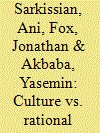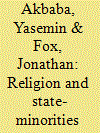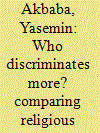|
|
|
Sort Order |
|
|
|
Items / Page
|
|
|
|
|
|
|
| Srl | Item |
| 1 |
ID:
108934


|
|
|
|
|
| Publication |
2011.
|
| Summary/Abstract |
This study focuses on explaining the variation in the treatment of religious minorities in Muslim-majority countries using a novel dataset on religious discrimination-the Religion and State-Minorities (RASM) Dataset. As few theories exist to explain the causes of religious discrimination, this study compares theories related to general religion-state relations based on ideology, culture, and rational choice. We find that while political and structural factors are important in explaining variation in levels of discrimination across Muslim countries, ideational factors may help to explain why certain minority groups appear to be targeted more than others within individual countries. Regional and cultural differences in levels of discrimination exist across the Muslim world, and the identity of the religious minority group matters in determining why some groups face greater repression than others. We argue that knowing the targets of discrimination is important in developing theory about the causes of it.
|
|
|
|
|
|
|
|
|
|
|
|
|
|
|
|
| 2 |
ID:
109197


|
|
|
|
|
| Publication |
2011.
|
| Summary/Abstract |
This article presents the Religion and State-Minorities (RASM) dataset addressing its design, collection, and utility. RASM codes religious discrimination by governments against all 566 minorities in 175 countries which make a minimum population cutoff. It includes 24 specific types of religious discrimination coded yearly from 1990 to 2002. Religious discrimination measures the absence of the human right of religious freedom which includes limits on religious practices such as worship as well as limits on religious institutions such as churches and mosques which are not placed on the majority group. Thus the dataset focuses on the restriction of religious group rights. Most similar datasets, including those that focus on human rights in general, include a single discrimination score for a country. RASM is the first to contain an accounting of religious discrimination against all relevant religious minorities on an individual basis while avoiding some methodological problems of previous similar data collections. In order to demonstrate the utility of the dataset, we examine the relationship between religious identity and religious discrimination. We find that both majority and minority identities matter in predicting the treatment of religious minorities. This demonstration that codings for individual minorities add to our understanding of the correlates of religious discrimination is illustrative of the potential uses of this dataset. It also indicates that this type of data can be useful in other types of studies where dyads based on religious identity are relevant, such as studies of ethnic conflict and civil war.
|
|
|
|
|
|
|
|
|
|
|
|
|
|
|
|
| 3 |
ID:
135900


|
|
|
|
|
| Summary/Abstract |
This paper explores religious discrimination against ethnic groups and foreign policy crisis linkages as part of the broader foreign policy approaches developed by McGowan and Shapiro (1973) and James and Özdamar (2005, 2008). Informed by the literature suggesting that domestic policies of repression and inequality may result in similar patterns of behavior internationally, this study tests whether states characterized by high levels of religious discrimination against ethnoreligious minorities are more likely to initiate or become involved in foreign policy crises with other states in general. A broad range of data sources, including an independently collected religious discrimination index, are used to test the hypothesized relationship between religious discrimination and international crisis during the period 1990–2003. The results suggest that religious discrimination is an important predictor of initiating and becoming involved in international crises.
|
|
|
|
|
|
|
|
|
|
|
|
|
|
|
|
| 4 |
ID:
103122


|
|
|
|
|
| Publication |
2009.
|
| Summary/Abstract |
Unlike its presence in the world of politics, religion failed to take a prominent role in political science in much of the modern era. Recent research suggests this might be changing. It also suggests that in order to study religion, scholars need more data on the subject. This study introduces a new data collection on religious discrimination at the minority level and uses this new data collection to compare religious discrimination in western democracies, Asia and the Middle East for the time period 1990-2004. In this paper, religious discrimination, ethnicity and religion are first discussed with specific emphasis on Muslim majority states and the Middle East. Second, the process of data collection, including case selection, forming a religious discrimination index, coding and back-up coding issues, is outlined. Finally, results on religious discrimination in different regions and states with different majority religions are presented. The data indicate that western democracies treat their religious minorities much better than Middle Eastern countries or Asian countries. Yet the Middle East, which is considered the most prominent example of a region with religious tension, does not have significantly higher average religious discrimination values than Asia. Similarly, even though states with a Muslim majority seem to be less tolerant compared to states with a Christian majority, in states with other majority religions such as Buddhism or Hinduism, discrimination against ethnoreligious groups is present as well. Moreover, religious discrimination values for the minorities in western democracies increased after September 11.
|
|
|
|
|
|
|
|
|
|
|
|
|
|
|
|
|
|
|
|
|